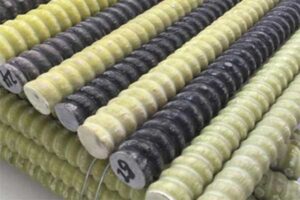What is Composite rebar?
Composite rebar, also known as fiberglass rebar, is a type of reinforcement material used in construction to strengthen concrete structures. It is made of glass fibers embedded in a polymer matrix, typically epoxy or polyester. Compared to traditional steel rebar, composite rebar has several advantages that make it a suitable alternative in certain applications.

Fiberglass Composite rebar
Advantages of Composite Rebar
- Corrosion Resistance: Composite rebar is impervious to environmental elements such as water, salt, and chemicals, making it a more durable, longer-lasting reinforcement material.
- Lightweight properties: Composite rebar is much lighter than steel, making it easier to transport and install, reducing labor costs and increasing efficiency. Additionally, its lightweight nature makes it a suitable choice for buildings or structures where weight is a concern, such as bridges and high-rise buildings.
- High Strength-to-Weight Ratio: Composite steel bars can provide the same strength as steel bars, but with less material. This makes it a cost-effective option for large construction projects. Additionally, composite rebar can be manufactured in a variety of sizes and shapes, allowing for greater design flexibility and customization.
- Durability: Composite rebar has proven to be a long-lasting and durable reinforcement material. Its service life is estimated to be over 100 years, considerably exceeding the 25 to the 30-year service life of rebar. This means that composite steel bars can be used in projects where longevity is a concern, such as infrastructure projects.
- Non-conductive properties: This makes it a suitable choice for use in electrically sensitive environments. Additionally, its high fire resistance makes it a suitable choice for use in buildings and structures where fire resistance is a concern.
Disadvantages of Composite Rebar
- Cost: Composite steel bars are generally more expensive than steel bars, which can be a major factor when considering their use in construction projects. However, in some applications, the benefits of composite steel such as corrosion resistance, long life, and high strength-to-weight ratio may outweigh the additional cost.
- Another disadvantage of composite rebar is that it is not as widely available as rebar. This can make procurement difficult, especially for large construction projects. Additionally, supplier and manufacturer options may be limited, which can result in higher costs and longer lead times.
In conclusion, composite rebar is a type of reinforcement material that offers several advantages over traditional steel rebar. Its corrosion resistance, lightweight properties, and high strength-to-weight ratio make it a suitable alternative for certain applications. However, it is important to consider the cost and availability of composite rebar when deciding whether to use it in a construction project. With the advancement in technology and expansion of the market, composite rebar is gaining more recognition and it is expected to be a more common material in the future.




























